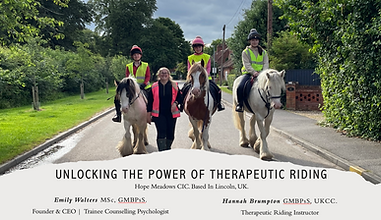Level 4 Diploma
Therapeutic Riding Instruction
for Mental Health
Feel confident in your skills. Diversify your income. Embrace new opportunities.
Small cohorts for a personalised training experience
OFQUAL registered
and accredited by Crossfields Institute
Placement opportunities with us for hands-on experience with full support


Are you passionate about horses and helping others? Our Level 4 Diploma in Therapeutic Riding Instruction equips you with the theory, framework and practical skills to make a positive impact in the lives of individuals with mental health difficulties.
Created and run by our brilliant team of therapists and instructors, this diploma brings you the theory and frameworks to deliver your own therapeutic riding programme. Based on many years of clinical skill, knowledge, and practice experience, this qualification promotes a reflective approach to therapeutic riding sessions. Throughout the course you will learn how to work with clients of various needs, facilitate the bond between horse and rider, and reflect on your own practice. Book a free chat with one of the course team, or download our application form to get started!
Modules
1
Ethical Practice
Terminology, horse welfare, risk management and duty of care.
2
Working with Difference & Diversity
How difference, diversity, and power can impact therapeutic riding.
3
Mental Health & Therapeutic Relationships
Common mental health concerns and how to support them.
4
Introduction to Riding Instruction
All you need to know to safely run a riding session
5
Creating a Therapeutic Environment
Explore the environments you create and the impact this has.
6
The Therapeutic Riding Horse
Matching horses to riders psychologically, allowing the horse to be authentic, and managing a therapeutic herd.
7
Physical Experiences
The usefulness of touch, movement, energy and body language in relation to mental health and riding.
8
Assessment, Intervention & Evaluation
How to set therapeutic goals and achieve them
A short compilation of therapeutic riding sessions at Hope Meadows
A webinar overviewing our approach, the benefits/challenges, and the Level 4
Entry Requirements
General Entry Requirements
-
At least 21yrs old
-
Clean DBS check (can be completed through us if required)
-
Safeguarding training within last 2yrs (or commitment to complete by end of course)
-
First aid training within last 2yrs (or commitment to complete by end of course)
-
Have the ability to begin delivering therapeutic riding sessions throughout the course of the qualification.
Professional Entry Requirements
This qualification is open to both riding instructors and therapists. The following criteria apply.
Riding instructors:
Minimum CIEC Level 2/BHS Stage 2, or be able to evidence equivalent experience via a reference.
OR
Therapists:
Hold an appropriate qualification in counselling or psychotherapy, and have current registration with regulating body (e.g. BACP, UKCP, HCPC).
2026 Dates:
28th Feb & 1st March - Module 1
28th & 29th March - Module 2
25th & 26th April - Module 3
23rd & 24th May - Module 4
June - Mid-point reflective portfolio submission
18th & 19th July - Module 5
8th & 9th August - Module 6
September - Break
10th & 11th October - Practical assessment (modules 1 - 6)
7th & 8th November - Module 7
5th & 6th December - Module 8
16th & 17th January 2027 - Practical assessment (modules 7 & 8)
End of January 2027 - Final portfolio submission
Days will be 9.30am - 4pm, onsite at Hope Meadows in Lincoln, UK.
Pricing
Feb 2026: £3500
One payment of £3500
or
12 payments of £310
Discounts for multiple places booked.
Discounts available for staff from not-for-profit organisations (e.g. CICs)
Applying
Ready to Apply?
Click the word document button to download an application form.
Email it to us training@hopemeadows.co.uk

Course Team


